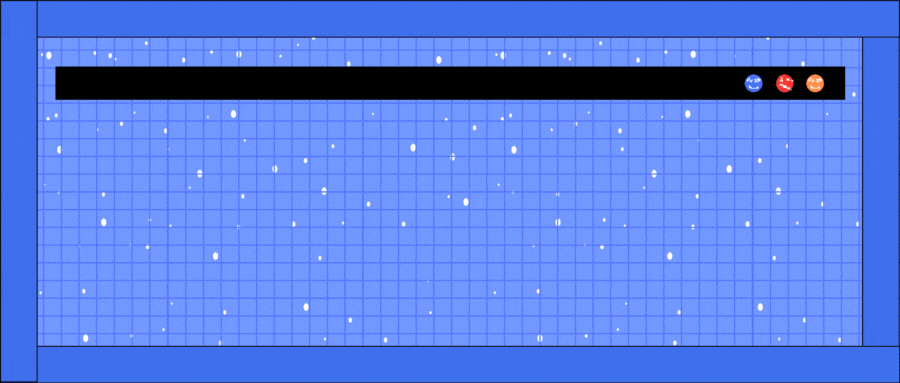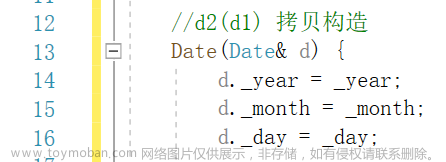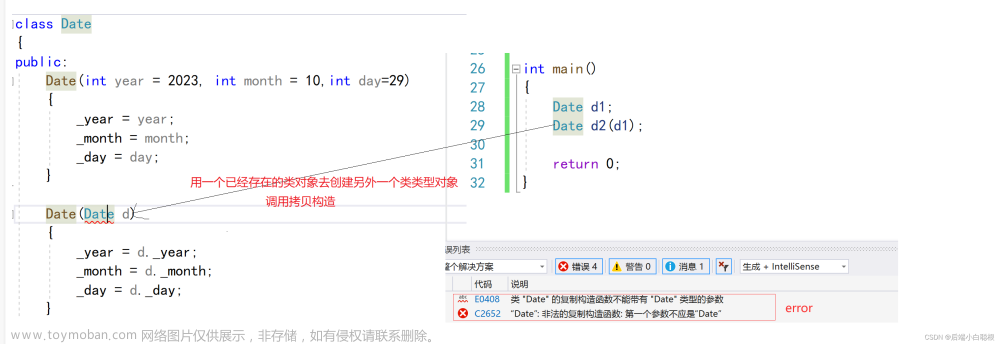

拷贝构造函数
概念
在现实生活中,可能存在一个与你一样的自己,我们称其为双胞胎
那在创建对象时,可否创建一个与已存在对象一某一样的新对象呢?
拷贝构造函数:只有单个形参,该形参是对本类类型对象的引用(一般常用const修饰),在用已存在的类类型对象创建新对象时由编译器自动调用
特征
拷贝构造函数也是特殊的成员函数,其特征如下:
- 拷贝构造函数是构造函数的一个重载形式
- 拷贝构造函数的参数只有一个且必须是类类型对象的引用,使用传值方式编译器直接报错,因为会引发无穷递归调用
class Date
{
public:
Date(int year = 1900, int month = 1, int day = 1)
{
_year = year;
_month = month;
_day = day;
}
// Date(const Date& d) // 正确写法
Date(const Date& d) // 错误写法:编译报错,会引发无穷递归
{
_year = d._year;
_month = d._month;
_day = d._day;
}
private:
int _year;
int _month;
int _day;
};
int main()
{
Date d1;
Date d2(d1);
return 0;
}

这里大家可能会很疑惑为什么会出现无穷递归的现象 下面我画一个图大家理解一下
- 若未显式定义,编译器会生成默认的拷贝构造函数。 默认的拷贝构造函数对象按内存存储按字节序完成拷贝,这种拷贝叫做浅拷贝,或者值拷贝
#include<iostream>
using namespace std;
class Date
{
public:
Date(int year = 1900, int month = 1, int day = 1)
{
_year = year;
_month = month;
_day = day;
}
Date(const Date& dd)
{
_year = dd._year;
_month = dd._month;
_day = dd._day;
}
void Print()
{
cout << _year << "/" << _month << "/" << _day << endl;
}
private:
int _year;
int _month;
int _day;
};
void func1(Date& d)
{
d.Print();
}
int main()
{
//拷贝构造函数
Date d1(2023, 10, 22);
func1(d1);
Date d2(d1);
注意:在编译器生成的默认拷贝构造函数中,内置类型是按照字节方式直接拷贝的,而自定义类型是调用其拷贝构造函数完成拷贝的
4. 编译器生成的默认拷贝构造函数已经可以完成字节序的值拷贝了,还需要自己显式实现吗?当然像日期类这样的类是没必要的。那么下面的类呢?验证一下试试?
class Stack
{
public:
Stack(size_t capacity = 3)
{
cout << "Stack(size_t capacity = 3)" << endl;
_a = (int*)malloc(sizeof(int) * capacity);
if (_a == nullptr)
{
perror("malloc fail");
/*exit(-1)*/return;
}
_capacity = capacity;
_top = 0;
}
~Stack()
{
cout << "~Stack()" << endl;
free(_a);
_capacity = _top = 0;
_a = nullptr;
}
Stack(const Stack& stt)
{
//深拷贝
_a = (int*)malloc(sizeof(int) * stt._capacity);
if (_a == nullptr)
{
perror("malloc fail");
exit(-1);//return;
}
memcpy(_a, stt._a, sizeof(int) * stt._top);
_top = stt._top;
_capacity = stt._capacity;
}
private:
int* _a;
int _capacity;
int _top;
};
int main()
{
//拷贝构造函数
Date d1(2023, 10, 22);
func1(d1);
Date d2(d1);
Stack st1;
func2(st1);
Stack st2(st1);
注意:类中如果没有涉及资源申请时,拷贝构造函数是否写都可以;一旦涉及到资源申请时,则拷贝构造函数是一定要写的,否则就是浅拷贝
5. 拷贝构造函数典型调用场景:
使用已存在对象创建新对象
函数参数类型为类类型对象
函数返回值类型为类类型对象
class Date
{
public:
Date(int year, int minute, int day)
{
cout << "Date(int,int,int):" << this << endl;
}
Date(const Date& d)
{
cout << "Date(const Date& d):" << this << endl;
}
~Date()
{
cout << "~Date():" << this << endl;
}
private:
int _year;
int _month;
int _day;
};
Date Test(Date d)
{
Date temp(d);
return temp;
}
int main()
{
Date d1(2022,1,13);
Test(d1);
return 0;
}

为了提高程序效率,一般对象传参时,尽量使用引用类型,返回时根据实际场景,能用引用尽量使用引用
赋值运算符重载
运算符重载
C++为了增强代码的可读性引入了运算符重载,运算符重载是具有特殊函数名的函数,也具有其
返回值类型,函数名字以及参数列表,其返回值类型与参数列表与普通的函数类似。
函数名字为:关键字operator后面接需要重载的运算符符号
函数原型:返回值类型 operator操作符(参数列表)
注意:
不能通过连接其他符号来创建新的操作符:比如operator
重载操作符必须有一个类类型参数
用于内置类型的运算符,其含义不能改变,例如:内置的整型+,不能改变其含义
作为类成员函数重载时,其形参看起来比操作数数目少1,因为成员函数的第一个参数为隐
藏的this
.* :: sizeof ?: . 注意以上5个运算符不能重载。这个经常在笔试选择题中出现
// 全局的operator==
class Date
{
public:
Date(int year = 1900, int month = 1, int day = 1)
{
_year = year;
_month = month;
_day = day;
}
//private:
int _year;
int _month;
int _day;
};
// 这里会发现运算符重载成全局的就需要成员变量是公有的,那么问题来了,封装性如何保证?
// 这里其实可以用我们后面学习的友元解决,或者干脆重载成成员函数。
bool operator==(const Date& d1, const Date& d2)
{
return d1._year == d2._year
&& d1._month == d2._month
&& d1._day == d2._day;
}
void Test ()
{
Date d1(2018, 9, 26);
Date d2(2018, 9, 27);
cout<<(d1 == d2)<<endl;
}
class Date
{
public:
Date(int year = 1900, int month = 1, int day = 1)
{
_year = year;
_month = month;
_day = day;
}
// bool operator==(Date* this, const Date& d2)
// 这里需要注意的是,左操作数是this,指向调用函数的对象
bool operator==(const Date& d2)
{
return _year == d2._year;
&& _month == d2._month
&& _day == d2._day;
}
private:
int _year;
int _month;
int _day;
};
以下是我们关于赋值运算符重载的总代码文章来源:https://www.toymoban.com/news/detail-737591.html
class Date
{
public:
Date(int year = 1, int month = 1, int day = 1)
{
_year = year;
_month = month;
_day = day;
}
void Print()
{
cout << _year << "/" << _month << "/" << _day << endl;
}
//int GetYear();
bool operator==(const Date& y)
{
return _year == y._year
&& _month == y._month
&& _day == y._day;
}
bool operator>(const Date& y)
{
if (_year > y._year)
{
return true;
}
else if (_year == y._year && _month > y._month)
{
return true;
}
else if (_year == y._year && _month == y._month && _day > y._day)
{
return true;
}
return false;
}
// d1 - d2
int operator-(const Date& d)
{
// ...
return 0;
}
int GetMonthDay(int year, int month)
{
assert(year >= 1 && month >= 1 && month <= 12);
int monthArray[13] = { 0, 31, 28, 31, 30, 31, 30, 31, 31, 30, 31, 30,31 };
if (month == 2 && ((year % 4 == 0 && year % 100 != 0) || (year % 400 == 0)))
return 29;
return monthArray[month];
}
// d1 += 100
Date& operator+=(int day)
{
_day += day;
while (_day > GetMonthDay(_year, _month))
{
_day -= GetMonthDay(_year, _month);
++_month;
if (_month == 13)
{
_year++;
_month = 1;
}
}
return *this;
}
// d1 + 50
/*Date operator+(int day)
{
Date tmp(*this);
tmp._day += day;
while (tmp._day > GetMonthDay(tmp._year, tmp._month))
{
tmp._day -= GetMonthDay(tmp._year, tmp._month);
++tmp._month;
if (tmp._month == 13)
{
tmp._year++;
tmp._month = 1;
}
}
return tmp;
}*/
Date operator+(int day)
{
Date tmp(*this);
tmp += day;
return tmp;
}
private:
int _year;
int _month;
int _day;
};
int main()
{
Date d1;
Date d2(2023, 10, 22);
bool ret1 = d1 > d2; // d1.operator>(d2) -> d1.operator>(&d1, d2)
bool ret2 = d1 == d2; // d1.operator==(d2) -> d1.operator==(&d1, d2)
// d1.operator>(d2);
// 一个重载哪些运算符呢?主要这个运算符有没有意义
// 有意义就可以实现,没有意义就不要实现
//d1 + d2;
d1 - d2;
//d1 * d2;
//d1 / d2;
d2 += 50;
d2.Print();
Date ret3 = d1 + 50;
d1.Print();
ret3.Print();
int i = 0, j = 0;
//i += 50;
int ret = j += i += 50;
return 0;
}
赋值运算符重载
- 赋值运算符重载格式
参数类型:const T&,传递引用可以提高传参效率
返回值类型:T&,返回引用可以提高返回的效率,有返回值目的是为了支持连续赋值检测是否自己给自己赋值
返回*this :要复合连续赋值的含义
class Date
{
public :
Date(int year = 1900, int month = 1, int day = 1)
{
_year = year;
_month = month;
_day = day;
}
Date (const Date& d)
{
_year = d._year;
_month = d._month;
_day = d._day;
}
Date& operator=(const Date& d)
{
if(this != &d)
{
_year = d._year;
_month = d._month;
_day = d._day;
}
return *this;
}
private:
int _year ;
int _month ;
int _day ;
};
- 赋值运算符只能重载成类的成员函数不能重载成全局函数
class Date
{
public:
Date(int year = 1900, int month = 1, int day = 1)
{
_year = year;
_month = month;
_day = day;
}
int _year;
int _month;
int _day;
};
// 赋值运算符重载成全局函数,注意重载成全局函数时没有this指针了,需要给两个参数
Date& operator=(Date& left, const Date& right)
{
if (&left != &right)
{
left._year = right._year;
left._month = right._month;
left._day = right._day;
}
return left;
}
// 编译失败:
// error C2801: “operator =”必须是非静态成员
原因:赋值运算符如果不显式实现,编译器会生成一个默认的。此时用户再在类外自己实现一个全局的赋值运算符重载,就和编译器在类中生成的默认赋值运算符重载冲突了,故赋值运算符重载只能是类的成员函数
3. 用户没有显式实现时,编译器会生成一个默认赋值运算符重载,以值的方式逐字节拷贝。注意:内置类型成员变量是直接赋值的,而自定义类型成员变量需要调用对应类的赋值运算符重载完成赋值文章来源地址https://www.toymoban.com/news/detail-737591.html
class Time
{
public:
Time()
{
_hour = 1;
_minute = 1;
_second = 1;
}
Time& operator=(const Time& t)
{
if (this != &t)
{
_hour = t._hour;
_minute = t._minute;
_second = t._second;
}
return *this;
}
private:
int _hour;
int _minute;
int _second;
};
class Date
{
private:
// 基本类型(内置类型)
int _year = 1970;
int _month = 1;
int _day = 1;
// 自定义类型
Time _t;
};
int main()
{
Date d1;
Date d2;
d1 = d2;
return 0;
}
前置++和后置++重载
class Date
{
public:
Date(int year = 1900, int month = 1, int day = 1)
{
_year = year;
_month = month;
_day = day;
}
// 前置++:返回+1之后的结果
// 注意:this指向的对象函数结束后不会销毁,故以引用方式返回提高效率
Date& operator++()
{
_day += 1;
return *this;
}
// 后置++:
// 前置++和后置++都是一元运算符,为了让前置++与后置++形成能正确重载
// C++规定:后置++重载时多增加一个int类型的参数,但调用函数时该参数不用传递,编译器
自动传递
// 注意:后置++是先使用后+1,因此需要返回+1之前的旧值,故需在实现时需要先将this保存
一份,然后给this+1
// 而temp是临时对象,因此只能以值的方式返回,不能返回引用
Date operator++(int)
{
Date temp(*this);
_day += 1;
return temp;
}
private:
int _year;
int _month;
int _day;
};
int main()
{
Date d;
Date d1(2022, 1, 13);
d = d1++; // d: 2022,1,13 d1:2022,1,14
d = ++d1; // d: 2022,1,15 d1:2022,1,15
return 0;
}
到了这里,关于【C++】:类和对象(中)之拷贝构造函数+赋值运算符重载的文章就介绍完了。如果您还想了解更多内容,请在右上角搜索TOY模板网以前的文章或继续浏览下面的相关文章,希望大家以后多多支持TOY模板网!














